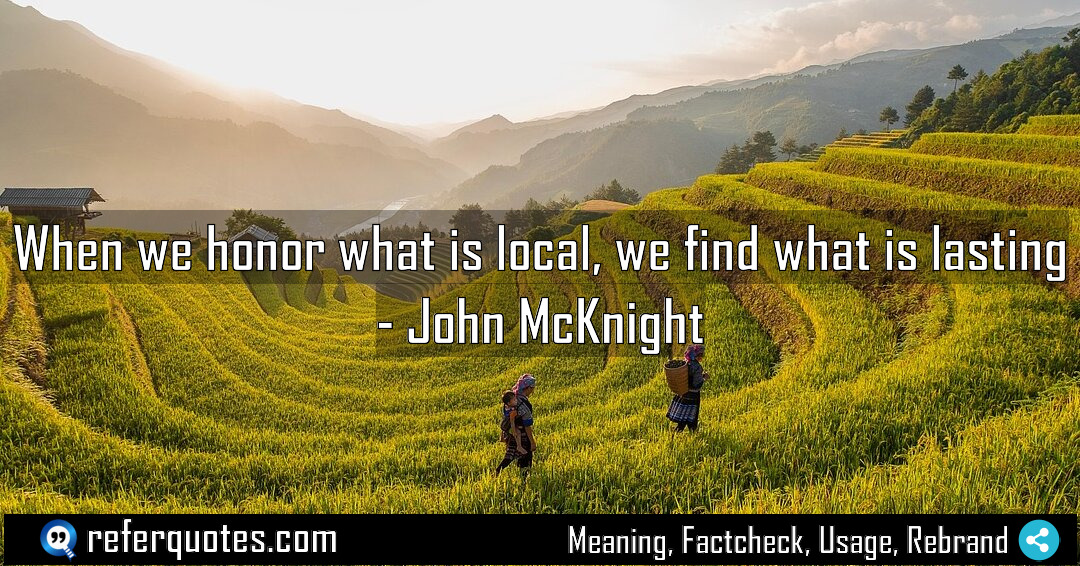
When we honor what is local, we find what is lasting… it’s a powerful reminder that the solutions we desperately search for are often already right in our own backyards, embedded in the people and places we already know.
Share Image Quote:
Table of Contents
Meaning
At its core, this is about shifting our focus from seeking external, packaged solutions to recognizing and nurturing the inherent strengths, relationships, and wisdom that already exist within our own communities.
Explanation
You know, I’ve seen this play out so many times. We get caught in this cycle of thinking the next big app, the new government program, or the expert from out of town is going to save us. But what McKnight and Block argue—and I’ve seen it to be true—is that this approach is often fleeting. It’s a transaction. It comes and goes. But when you start with what’s local—the neighbor who bakes, the retired teacher who tutors, the shared stories at a block party—you’re not just solving a problem. You’re building a connection. You’re building social fabric. And that, my friend, is what lasts. It’s durable. It’s resilient. It’s abundant. It’s about moving from a mindset of consumer to a mindset of citizen, from client to co-creator.
Quote Summary
Reading Level67
Aesthetic Score85
Origin & Factcheck
This quote comes straight from the 2010 book The Abundant Community: Awakening the Power of Families and Neighborhoods by community activists John McKnight and Peter Block. It’s a cornerstone of their work and is sometimes, though rarely, misattributed to other community-focused thinkers like Wendell Berry, but its true home is definitely in their book.
Attribution Summary
Author Bio
John McKnight, Professor Emeritus at Northwestern University had spent decades of his life helping people rediscover the power of relationships. Being, co-founder of the ABCD Institute, his core idea revolves around communities that grows by identifying and connecting their assets. You’ll find the John McKnight book list here which are anchored by Building Communities from the Inside Out, The Careless Society, The Abundant Community, and The Connected Community.
| Official Website
Where is this quotation located?
| Quotation | When we honor what is local, we find what is lasting |
| Book Details | Publication Year/Date: 2010; ISBN/Unique Identifier: 9781605095844; Last edition: 2012; Number of pages: 192. |
| Where is it? | Chapter: Honoring the Local, Approximate page from 2012 edition: 216 |
Context
In the book, this idea is the antidote to what they call the “consumer society,” a system that teaches us we are deficient and that all solutions must be purchased from professionals or institutions. They frame the local community not as a list of problems to be solved, but as a treasure chest of untapped gifts, associations, and relationships just waiting to be honored and activated.
Usage Examples
Let me give you a couple of ways I’ve seen this work. Imagine you’re a City Planner frustrated with a sterile, underused public park. Instead of just commissioning another expensive sculpture, you host a “skill share” where locals teach gardening, chess, or yoga. You’ve just honored local talent, and the park becomes a lasting hub of activity.
Or, you’re a Business Leader wanting to improve company culture. Skip the generic team-building seminar. Instead, create a forum for employees to share their unique passions and hobbies—the hidden gifts within your own corporate “neighborhood.” The connections formed there will be far more lasting than any forced exercise.
This is perfect for Community Organizers, Educators, and honestly, anyone feeling disconnected and looking for more meaningful engagement right where they live.
To whom it appeals?
Share This Quote Image & Motivate
Motivation Score82
Popularity Score78
Shareability Score83
FAQ
Question: Doesn’t “honoring the local” mean rejecting all outside help or new ideas?
Answer: Not at all. It’s about starting with your assets. It’s a “first, look inside” approach. Outside help is most effective when it’s invited in to support and amplify the capacities that the community itself has already identified and mobilized.
Question: What if my community feels truly broken or deficient?
Answer: I hear you. This is the hardest part. The book’s whole point is that no community is actually deficient; it’s just that its gifts are often invisible, even to itself. The first step is a simple act of mapping—literally walking around and making a list of everyone’s skills, passions, and assets, no matter how small they seem. You’ll be shocked at the abundance you uncover.
Question: How is this different from simple nostalgia?
Answer: Great question. This isn’t about yearning for a romanticized past. It’s a practical, forward-looking strategy. It’s not about recreating the 1950s; it’s about using the timeless principles of connection, reciprocity, and shared responsibility to solve modern problems in a sustainable way.
Similar Quotes
Our neighborhoods thrive when we replace complaints… it’s a powerful shift from passive griping to active building. This mindset transforms communities from the inside out, turning problems into possibilities. Table…
Measure what matters and celebrate progress loudly… it sounds simple, right? But this is one of those deceptively powerful leadership principles. It’s not just about tracking numbers; it’s about creating…
In an abundant community, every person matters because it’s not about what we lack, but about the incredible gifts we already have. It’s a powerful shift from seeing needs to…
Every neighborhood has within it the gifts needed… It’s a powerful idea that shifts our focus from what’s missing to what’s already there. This isn’t just feel-good theory; it’s a…
When families know their neighbors, you see a real shift. It’s not just about safety; it’s about building a web of mutual support. This simple act transforms a collection of…
